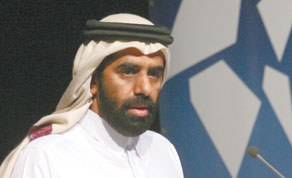 |
| Saleh al-Nabit: “Qatari youth are being positively and negatively affected by globalisation |
Qatar’s third National Human Development Report, addressing key issues affecting Qatari youth, was launched on Thursday by the General Secretariat for Development Planning (GSDP) and the UN Development Programme at a conference geared towards advancing the goals of the report and sharing ideas between stakeholders.
The report covers important areas, including Qatari youth in a changing demographic and socioeconomic setting, building knowledge and developing skills, enhancing labour force participation, improving health and well-being and empowering young people and promoting civic participation.
Saleh al-Nabit, the GSDP Secretary General, said that among the changes affecting Qatar’s youth were rising ages for first marriages, falling birthrates and increased childlessness and higher rates of divorce, particularly in the first few years of marriage.
Al-Nabit said: “Qatari youth are being positively and negatively affected by globalisation, especially in the revolution in information and communication technology. The trend calls for intercultural understanding and tolerance as well as intergenerational dialogue because these are important factors and the report has given specific accommodations in this regard.”
The report discusses the rather substantial investments in education and training infrastructure, creating opportunities for young Qataris. “But education performance as measured through examination results is not progressing at a commensurate pace despite a decade of reforms. Stronger incentives and opportunities to retain youth in education through the tertiary levels are required,” said al-Nabit.
The report also warns that there is a decline in interest in science and mathematics as subjects of study in secondary and tertiary education, which has led the closure of major science and mathematics programmes at Qatar University at a time when the demand for graduates has increased.
Qatarisation of the workforce is a key part of the National Vision 2030, and “young Qataris have enjoyed a range of choices in joining the labour market, but many lack the skills and qualifications to take advantage of them,” said al-Nabti. The report recommends “creating a system of a second chance, which means that we give them another choice. That is to say that if a young man cannot continue his university education at the first opportunity, he should be given a second chance.”
It makes specific recommendations in order to navigate critical issues, one being the integration of women at all levels of society. While the report says that women are in fact leading men in education success, more work is still to be done in tackling female unemployment and the lack of women in key areas.
The report calls for the creation of a women’s leadership centre designed to “strengthen and build women’s capacities. The challenge for the centre will be to remove key impediments to women taking up leadership positions in political life and in society. Quality leadership training will help provide the technical and soft skills needed for these positions.”
A programme will also be initiated to” change public perceptions of the role of women in employment, business and society”, including a “new civil society organisation to promote and advocate for women’s issues.”
Qatar has made substantial investments in healthcare to achieve world-class standards, but the report says that development has brought a new set of challenges.
“As in most affluent societies, being overweight and obese is highly prevalent among young Qataris. This is because of some customs and lifestyles that have led to being overweight and illnesses related to being overweight,” said al-Nabit.
The report gives special consideration to factors inhibiting women’s participation in physical activity, such as family tradition, embarrassment at being observed while exercising, male family members forbidding going out for sports and responsibilities of daily life.
The report also shows that the rate of deaths, invalidity and special needs are increasing because of road accidents and reckless behaviour, and calls for better education, promotion and encouragement for people to have a healthy lifestyle.
The focus on youth is crucial as, al-Nabit said, “today’s young men and women are in fact tomorrow’s workers and leaders...they are an asset in their communities.”
Qatar has jumped from 57th in 1999 to 37th in 2011 in the UN Development Programme’s Human Development Index. As of 2010, there are more than 252,000 Qatari youth.

